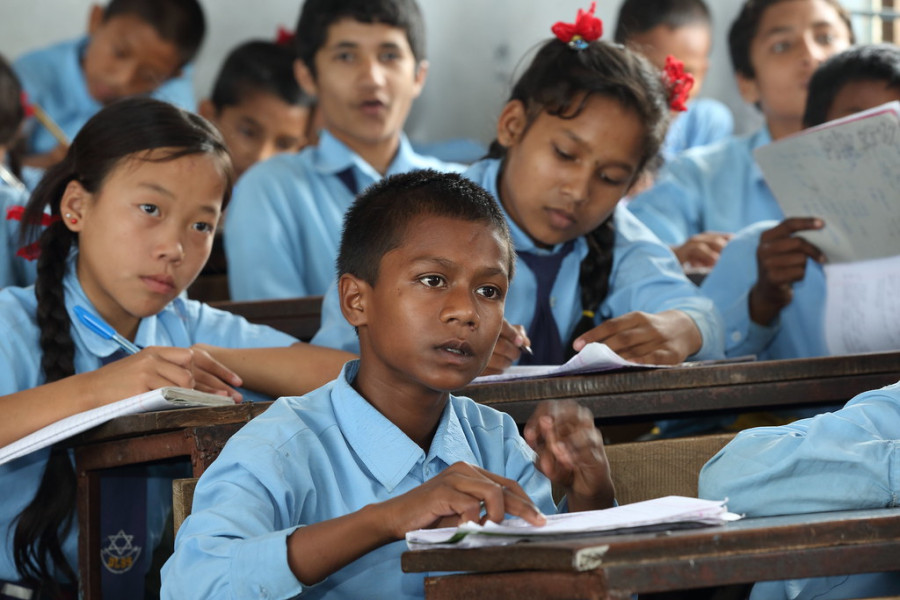Columns
Listening to students
Involving students in the feedback process helps hold educators accountable for their actions.
Bijaya Mani Paudel
Our education system has long been based on the notion that students are empty vessels to be filled by teachers and curricula. This means that decisions on curricula are made without considering students’ interests. Teachers are expected to faithfully deliver these curricula without consulting their students on how they prefer to learn or what subjects pique their interest.
However, the success of our education system depends on the students it serves. Students are not just passive recipients of knowledge but catalysts for change and the future builders of the nation. Despite this, their voices often remain unheard and unheeded. This calls for a culture of listening to students, respecting their perspectives and actively integrating their feedback into our educational landscape.
Marginalising student voices
Nepal has taken steps to support the professional growth of its public school educators through teachers’ professional development (TPD) programmes. These initiatives are undoubtedly essential for the continued evolution of our teachers. However, we lag in acknowledging that students’ feedback on their classroom experiences offers invaluable insights to the teachers into enhancing the teaching and learning process.
While training programmes often solicit feedback from teachers about their experiences and the effectiveness of initiatives like TPD, it is equally important to invite students to share their perspectives. If students consistently report similar experiences before and after training, it may be time to rethink our approach to teacher training. Moreover, involving students in the feedback process helps hold educators accountable for their actions.
One potential reason for the marginalisation of student voices might be deeply rooted in our culture. Children’s opinions are often undervalued and sidelined from an early age in favour of those of adults. Whether it’s within the family, during festivals, or in our day-to-day lives, we rarely seek input from our youngest members. When children voice their ideas or ask questions, they’re dismissed or mocked. Unfortunately, this trend has extended to our schools and other educational institutions.
Despite limited exposure to the outer world, students possess a wealth of unique experiences, perspectives and opinions. Even the youngest learners, such as those in nursery or kindergarten, have valuable insights to share. They can articulate their expectations for teachers’ behaviour and describe the ideal school environment. They can readily express their preferences for favourite teachers and discuss those they may not connect with. It’s essential to recognise that students might not always communicate in the polished manner that adults expect. Their expressions may lack linguistic or grammatical sophistication, but their voices are undeniably valuable.
Why listen to students?
The benefits of listening to students are manifold. First and foremost, their perspectives can significantly enhance the quality of education in our schools. By taking their views into account, educators can adapt their teaching methods to better align with students’ needs, ultimately fostering a more effective learning environment. Additionally, their input can influence the design of child-friendly school spaces, promoting holistic development.
Furthermore, when governments actively seek students’ input, it enables them to formulate policies and plans that cater to their specific needs. This not only benefits students directly but also nurtures a sense of ownership over their education. When students feel heard and respected, their confidence soars, leading to enhanced performance.
Fostering a culture of listening to students also plays a crucial role in nurturing democracy within the educational system. It empowers young citizens to voice their concerns and contribute to decision-making, preparing them for active societal participation. It’s imperative to establish safe spaces where students feel comfortable sharing their feedback to foster an inclusive environment for students’ input. This can be achieved through various means, such as conducting anonymous surveys, hosting focus groups, or engaging in one-on-one conversations. Creating these avenues for expression empowers students to voice their thoughts openly and honestly.
As crucial is the attitude with which the facilitators approach student feedback. To ensure students feel heard and respected, we must adopt an open-minded and non-judgmental stance. When students take the initiative to share their insights, we should listen attentively without becoming defensive. This encourages constructive dialogue, leading to positive changes in the educational experience. When students raise concerns or offer suggestions, it is essential to investigate them thoroughly and, when appropriate, take meaningful action. This not only demonstrates our commitment to their well-being but also reinforces the notion that their voices hold genuine influence.
Listening to students is essential for building a more dynamic and responsive education system. By embracing student feedback, we can create a learning environment better aligned with their needs and interests, leading to improved outcomes for all. The experiences and challenges they face within these institutions can help them develop and execute policies that truly benefit them. It’s time to empower our students and unleash the untapped potential within our education system.




 9.89°C Kathmandu
9.89°C Kathmandu















